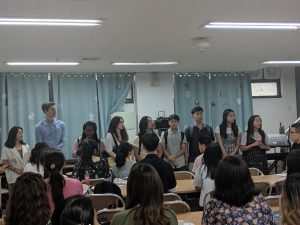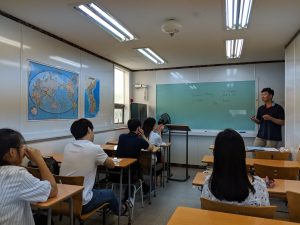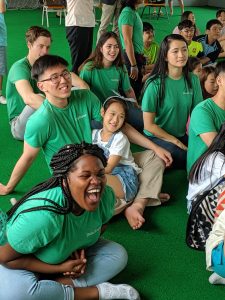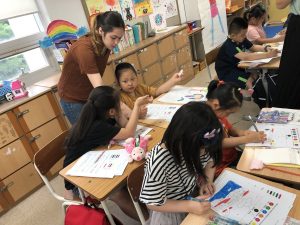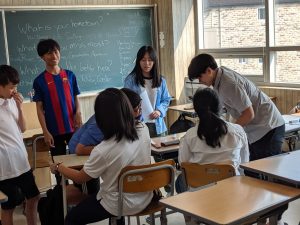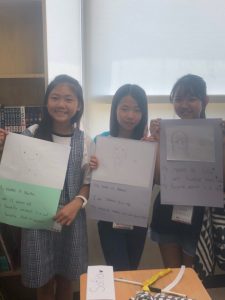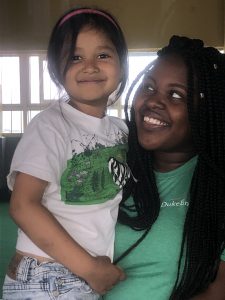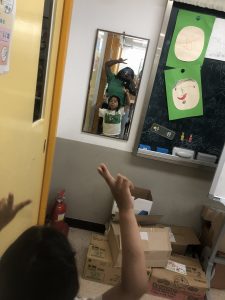Just two hours ago, our time at Jiguchon came to an end. We said our final goodbyes to the teachers and students, walking through each classroom one last time. Gave a few last minute hugs, walked down the stairs, and then closed the door to the school that for the past month that we called our school and home.
But I get ahead of myself. So much happened in the past two weeks that it would be a shame to only focus on the goodbyes of today.

Let’s start with week 3: 예비반
The multicultural class was a handful. It was helpful to have all eight of us in the same classroom because we got to have two teachers per table group of 3-4, so we had a lot of interaction with the individual kids. But at the same time, it was a pretty big challenge still. Unlike the other classes, where everyone speaks primarily Korean, the multicultural class’s Korean and English levels fluctuated drastically. Some kids (like Eunice), were really good at English, while others could barely understand anything we said. Almost all of the kids spoke Chinese, which was a relief (at least for me), since I could finally understand what most of the kids were saying. But at the same time, there were also kids who couldn’t speak Korean or Chinese. Manse only spoke Mongolian, and Forjune had better English than most, but was fluent in Thai. Crossing those two language barriers were a struggle, but everyone tried their best to use Google Translate to talk to them and make sure that they understood the instructions.
In many ways, the multicultural classroom reminded me of teaching the middle schoolers. We did our best to teach in a mix of English, Chinese, and Korean. But even so, Lisa and Hanly (the two oldest girls who had good Chinese and good Korean) would translate to the other younger kids instructions, or helping out the other kids when they didn’t understand. Even though the kids were a mix of ages and grades, it was incredibly heartwarming to see how much they cared about each other and wanted each other to do well. Yes, they made fun of each other. Yes, during some of the games they would be upset when their classmates messed up for their team (and of course, we talked to them about being more supportive). But at the end of the day, when I think back to the multicultural class, what I remember most is how close they all were. Despite language and age differences, they were friends. Hanly would hug Kitty (the youngest and smallest girl in our class) like she was her older sister. When Mijoo was crying over losing a game for her team, Cassie went up to draw together with her at the blackboard until she felt better.
Really, the kids had so much love.
In some ways, I felt more connected to the multicultural class. Maybe it’s because I could actually speak to more of them in a language I was more comfortable with, I don’t know. But the kids became so attached. Even after we left the multicultural class to teach the next grades, Mijoo and Cassie and Kitty would come without fail to visit us in the 2nd grade classroom. They’d pull me over to try to eat lunch with them, and cutely pout and whine if I sat anywhere else.
 But what amazed me most about the multicultural class was how hopeful they were. Even though they were working on learning both Korean and English, they were still willing to learn. They still gave their all to us in the one week that we got to teach them. And I’m so thankful for that.
But what amazed me most about the multicultural class was how hopeful they were. Even though they were working on learning both Korean and English, they were still willing to learn. They still gave their all to us in the one week that we got to teach them. And I’m so thankful for that.
Two kids really stood out to me that I wanted to call attention to in this posting: Eunice and Forjune. Both of them are probably only 12 years old. But when we asked them what they wanted to do in the future, Eunice said that she wants to be a businesswoman and Forjune said that she wants to be a teacher in Thailand. Hearing that, I really was so amazed. Most of the other kids at Jiguchon have no clue what they want to be in the future. Even the middle schoolers, when I ask them what they want to do in the future, they have no clue. I really think that it’s a beautiful thing that Eunice wants to be a businesswoman and Forjune wants to be a teacher. I truly believe in them and their abilities, and I hope that they can achieve their dreams. We made sure to tell them that we thought they could do it. They shook their heads and laughed, but I hope they know that the eight of us will be cheering them on, no matter where we are.
Week 4: 2nd grade
I think we all expected 1st and 2nd grade to be the easiest to manage. At least I did. For some reason, I assumed that as we moved down to teach the younger grades, they would just become better-behaved. But of course, 2nd grade was probably the hardest grade we taught so far.
The classroom dynamic was probably the most difficult part, particularly with the girls. Though they were all only nine years old, they formed cliques. It was pretty rough. Two of the girls would exclude the other girls that they didn’t like. We tried our best to stop it, but it was hard when they wouldn’t want to hold hands with some of the other girls, or refuse to play with them. Even though we would explain to them how important it was to include everyone, they didn’t seem to understand.
The varying levels was also pretty hard. Seiya barely understood any English (or Korean I think? She had trouble understanding directions). The three boys (James, Hansel, and Peter) all had pretty good English. Or at the very least, they learned fairly quickly compared to the rest of the class. Whenever we played games, we had to split them up so that the teams would be more even. We ended up splitting up the class sometimes to teach vocabulary, which helped a lot. Before, the three boys would just shout out the answer and the rest of the class would just repeat what they said without actually learning. So splitting up helped a lot.

The second graders definitely learned the slowest out of all of the classes that we taught though. They picked up vocabulary slower, and remembered things a lot less. In the one week that we taught them, I don’t know how much they learned or how much they retained. I think we were able to reinforce a lot of the alphabet and introductions (I think all of the kids can now successfully say “My name is ____,” “I am nine years old” and things like that). But I wish that we could have more time with this class since they learned so much slower.
But despite all of the challenges, I feel like I got close to some of the 2nd graders. They were definitely the wildest and goofiest class, and I found the three boys were easiest to get close to. They liked to play games with me (a lot of them ending with me losing and getting flicked on the forehead as a result).
I’ll miss them.

Middle School
Every week, middle school gets better. Out of all of the kids in the school, I feel the most connected to the students in middle school, at least the ones that I work directly with. The classroom dynamics in the middle school continue to amaze me. I can’t even begin to convey how supportive they are of each other. Pavel (the Russian speaker) still struggles with Korean, yet the kids still try their best to support him and translate what they can. When Yahan doesn’t understand what Nikki or I am saying in English, Jongsu and Jooeun jump in and try to translate to Chinese or Korean. Even though they kind of ruin our intention to challenge his listening abilities, I still think it’s so sweet that they try their best to help him.
Aside from that, we tried something new this week. After talking to the middle school teacher, she wanted us to just talk to the kids about our experiences and our lives to try to inspire them. So we broke up into groups of the kids that we had connected the best with. I had Nayoung (the girl who wants to be a translator in the future), Boram (one of the girls that I teach for English), and Yeoeun (another girl that I help teach English to when I teach the English elective class). I opened the class time to just questions that they had. Boram had so many. She asked about almost everything, ranging from colleges in America to everyday American teenage life. I tried to answer her questions as best as I could. I asked them about their dreams and whether they wanted to go to college. They all said yes, though one of them said that they didn’t think that they could. I tried not to prod about why, because she didn’t want to talk about it. But thinking about that makes me really sad. I hope that they all have the opportunity to go to college if they can. Their teacher said that these students have some sort of a special tract that makes it slightly easier for them to get into college, so I hope that she can go if she wants to.
The girls also opened up to me about their stories. They talked to me about how they had all ended up from China to Korea, and how hard it was for them to adjust. Some of them traveled by train for days, following their parents. I was touched that they trusted me enough to tell me their stories. Each of these students have so much going on in their lives, and so much baggage that they’re carrying. I don’t know what I can do in the position I am in to help them in their situations. But at the very least, I’m glad that I had the chance to listen.
Goodbye, Jiguchon
Though we still have to come back to teach middle school for two more weeks, today marked the end of our time at Jiguchon with the elementary schoolers. We had the final closing ceremony today. Thomas rapped “See You Again” with our 5th grade Martha. Nikki, Erin, and I danced with some of the girls from all of the grades to “Everyday” that we practiced during many classroom breaks throughout our time here. And then all of us danced to something that Shey, Erin, and Nikki choreographed. The kids seemed to love it. And then we gave our closing remarks. Standing in front of all of the kids, I had so much to say. I wanted to tell them how thankful I was to all of them for our time here, how grateful I was for all of the love that they showed us, and how much happiness they had brought into our lives. I wanted to tell them that I was so proud of them, and that I knew that they could go great places. But, in the end, all I could choke out without crying was a few short sentences.
After that, the kids came up to take pictures with us and say their goodbyes. To say the least, it was an emotional time. The kids came up and started giving us hugs while crying. Seeing them cry, most of us just started breaking down crying with them. My 5th graders (Annie, Sophia, and Martha) sat on the ground crying. The girls in the multicultural class (Cassie, Kitty, Mijoo) swarmed me in a mob of tears and hugs. Miyeon sat on Thomas’s lap and sobbed. Nancy came up to me and said that she would miss me. I cried really hard. It’s hard to describe the emotions that were running through all of our heads at the time. All of the gratefulness, all of the happiness, all of the bittersweet feelings.
Finally, I just wanted to close off this post and my time at Jiguchon with a message to the kids who have made this experience for me.
To the kids at Jiguchon:
First of all, thank you. Thank you for allowing me to be your teacher during these four weeks. Thank you for giving me your time, and your attention, and your 100%. Thank you for all of the smiles, for all of the laughter, for all of the amazing memories that I’ll carry with me for the rest of my life. But most importantly, thank you for all of the love that you all showed me. You all were truly the best part of my day. In all of the stress and struggles that are going on in my life, thank you for showing me your love. As silly as this sounds, seeing all of you reminded me that there is good in the world. You showed me that even in the struggles that you all face in your daily lives, that you’re all able to still find happiness in the simplest of things. More than anything I gave you all, you all inspired me. To become a better teacher. To find different ways to communicate. To approach the world with the same optimism, happiness, and love that you all do.
Now for each of my classes.
To my 5th graders, thank you for welcoming me into this school with open arms. It was incredibly terrifying to suddenly become a teacher, on top of not being able to speak Korean. Thank you for all of your patience despite all of the mistakes that I made. Particularly to Annie, thank you for making me feel welcome in your class. Thank you for waving me over to sit with you all during lunch on the first day when I had no idea where to go, and for bringing me over to learn how to dance “Everyday” with you all.

To my 4th graders, thank you for all of the energy. You all tired us out so much, but it meant so much that you all directed that passion into the classroom activities that we did. Even during break times, you all would drag me and Nikki to start dancing with you all. And in the end, we were able to join you all to dance “Everyday” for the closing ceremony. To Nancy, thank you for including us in this and making sure that we learned the dance. I could see how much effort that you put into leading the kids to learning the dance, and I appreciated all of the time that you put in to creating this special opportunity for us.

To the 3rd graders who I never got to teach, thank you for letting me into your class. I would come into your classroom during break times to just breathe and rest from all of the energy that was happening in the 4th grade class. Eventually, you let me into your classroom and played with me too. Particularly to Miyeon, thank you for being like a little baby sister to us. To Mandy, though I always complained, I loved it when you dragged me everywhere to play the plane game with you. Though my arms would fall off as I carried you around and spun you everywhere, it made me happy to make you laugh and scream.

To the multicultural class, thank you for all of the love. For all of the love that you showed each other, and all of the love that you showed the eight of us. Though my Chinese wasn’t the best and I had to rely on Google translate sometimes, you all still were so patient with me, and so open. During breaks, you all would come up to me and grab onto my arms and whine to me about this or that. To Mijoo, thank you for the drawing you painted for me. I’ll treasure it forever. I hope that you will continue to keep smiling and drawing even when things get hard for you. To Forjune and Eunice, you two have great futures ahead of you as teachers and businesswomen. I truly believe in you.

To the 2nd graders, thank you for being a great class to end with. Though the material was a little challenging for you all, thank you for trying your best. For the last forty minutes, you all mobbed us with tickles and yells to take pictures. I wish that we could spend more time with you all since our time was cut short by the assembly, but I know that the teachers of Jiguchon will continue to make you all into great students.

And most importantly, to all of the teachers of Jiguchon. Thank you for letting us meet your students for a week, and for letting us teach your class. Thank you for all of the help that you gave us. But most of all, thank you for all of the time that you gave and continue to give to all of these kids. Every day, we saw how much these kids love and respect you all. Thank you for being our role models and theirs.
Jiguchon, I’ll miss you. Thank you for all of the love.
Until next time,
Emily




 Martin:
Martin:














